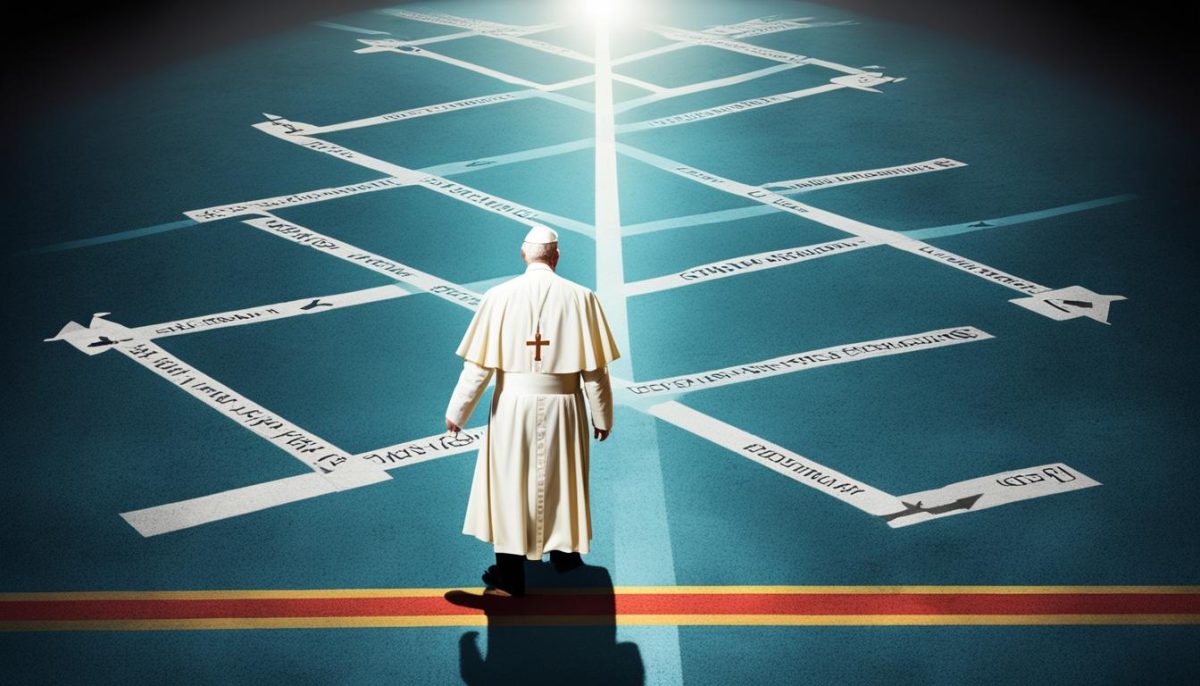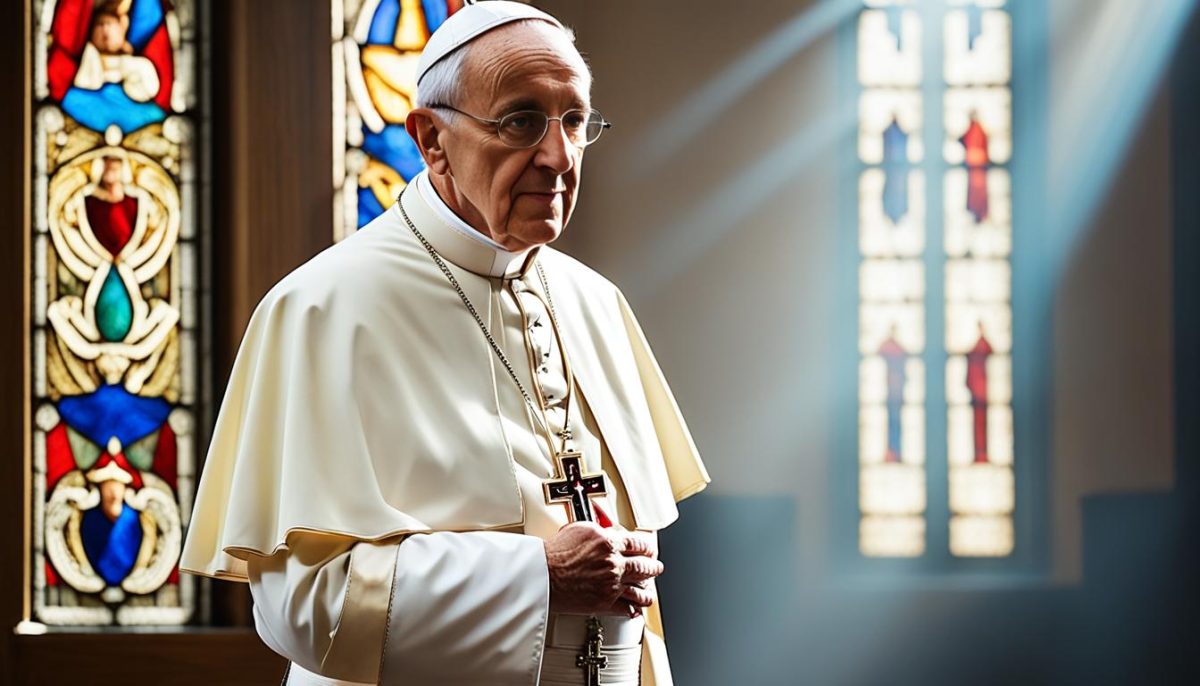The role of a pope extends far beyond ceremonial duties and spiritual guidance. At the heart of their leadership lies a profound understanding of conscience, serving as a moral compass in navigating critical decisions and shaping the direction of the Catholic Church.
In this article, we will explore the significance of conscience in the papal role, its influence on decision-making, and its impact on the overall guidance provided by the pope. By delving into historical insights and teachings of the Church, we will gain a deeper understanding of how the conscience of a pope shapes their leadership and upholds the core principles of the Church.
Join us as we examine the essence of papal leadership, diving into the ethical considerations, and moral dilemmas faced by popes throughout history. We will also explore the challenges that can arise in maintaining a steadfast conscience amidst external influences and societal trends.
Lastly, we will discuss the importance of nurturing a well-formed conscience in papal leadership. By understanding the strategies and practices for developing a strong moral compass, we can better appreciate the critical role it plays in guiding the actions and decisions of the pope.
Understanding the role of conscience in papal leadership
When we examine the leadership of a pope, one cannot overlook the significant role that conscience plays in guiding their actions and decisions. A well-formed conscience serves as a moral compass, pointing the way towards righteousness and justice.
Throughout history, numerous popes have demonstrated the profound influence of conscience on their papal leadership. Pope Francis, for instance, continuously advocates for social justice and the protection of the environment. These actions stem from the deep conviction and moral compass of his conscience to care for all of God’s creation.
The teachings of the Catholic Church also shed light on the importance of conscience in papal leadership. The Catechism of the Catholic Church affirms that “Man has the right to act in conscience and in freedom so as personally to make moral decisions” (CCC 1782). This recognition emphasizes the intrinsic link between conscience and individual autonomy, while still aligning with the moral teachings of the Church.
“Conscience is the voice of God within us.”
It is crucial to understand that the conscience of a pope is not a subjective or arbitrary force. Instead, it draws on the wisdom of scripture, the traditions of the Church, and the guidance of the Holy Spirit. The role of conscience in papal leadership is to discern the moral path that upholds the core values of faith, compassion, and service.
By examining the historical examples of papal leadership and the teachings of the Church, we gain a deeper understanding of how conscience shapes the decisions made by popes. Pope John Paul II’s unwavering commitment to human dignity and Pope Benedict XVI’s intellect and theological depth exemplify the conscientious leadership that guides the Church through challenging times.
The Impact of Conscience on Decision-making
Papal decisions, whether doctrinal or administrative, are not solely made through a unilateral exercise of authority. Instead, they are influenced by the conscience of a pope, which acts as a moral touchstone in the decision-making process.
Conscience allows for reflection, prayer, and consultation with both experts and the faithful. It encourages an openness to dialogue and a discernment of God’s will. By relying on conscience, popes are able to make decisions that are rooted in justice, mercy, and the pursuit of the common good.
For example, Pope Francis’s encyclical, Laudato Si’, which addresses the urgent need for environmental stewardship, reflects his conscience-led commitment to caring for our planet. This groundbreaking document was developed through a careful examination of scientific research, theological reflection, and moral discernment.
Nurturing a Well-Formed Conscience
In order to fulfill their papal leadership responsibilities, popes must cultivate and nurture a well-formed conscience. This involves a lifelong commitment to prayer, scripture study, engagement with theological teachings, and listening to the voices of the faithful. The formation of a well-formed conscience enables a pope to make morally sound decisions that uphold the integrity of the Church and its teachings.
Furthermore, the development of a well-formed conscience requires humility and a willingness to be shaped by the wisdom of the Church and the Holy Spirit. Pope Francis often emphasizes the importance of listening and being attentive to the signs of the times, recognizing the need for ongoing growth and discernment.
| Key Aspects of the Role of Conscience in Papal Leadership |
|---|
| 1. Guiding decisions with moral principles |
| 2. Seeking guidance from scripture, tradition, and the Holy Spirit |
| 3. Promoting justice, mercy, and the common good |
| 4. Openness to dialogue and consultation |
| 5. Fostering a well-formed conscience through prayer and theological reflection |
The moral considerations influencing papal decisions
When it comes to making decisions, the conscience of a pope is guided by a deep sense of moral considerations. The weight of these considerations plays a crucial role in shaping the papal stance on various issues. Ethical deliberation is at the core of the decision-making process, ensuring that the choices made align with the moral teachings of the Church.
“The Church cannot and does not engage in the politics of power, but in the service of peace, in the name of justice. It cannot and must not replace the state. Yet at the same time, it cannot and must not remain on the sidelines in the fight for justice.” – Pope Francis
One crucial aspect of considering moral implications is the weighing of principles. The papal leadership carefully evaluates different moral frameworks, analyzing the potential consequences and ethical implications of each course of action. This thoughtful evaluation allows the pope to discern the best path forward, one that upholds the values and teachings of the Church.
Case studies and examples provide valuable insights into the role of moral considerations in papal decisions. For instance, in addressing social justice issues, the conscience of a pope is deeply influenced by the moral imperative to care for the marginalized and vulnerable. This consideration compels the Pope to advocate for social equality, speaking out against poverty, inequality, and injustice.

Moreover, moral considerations shape the papal decisions on matters such as human rights, bioethics, and environmental stewardship. By prioritizing the well-being of individuals and the preservation of our shared planet, the conscience of a pope guides their leadership in promoting the dignity and sanctity of human life, respecting the sanctity of creation, and fostering sustainable practices.
| Moral Considerations | Impact on Papal Decisions |
|---|---|
| Social justice | Advocating for the marginalized and vulnerable |
| Human rights | Upholding the value and dignity of every human being |
| Bioethics | Guiding ethical decisions regarding human life and health |
| Environmental stewardship | Preserving and protecting our shared planet |
By considering these moral aspects and taking into account the complexities of the modern world, the conscience of a pope plays a significant role in shaping the papal decisions. The Pope’s commitment to moral teachings ensures that their leadership is grounded in compassion, justice, and the pursuit of the common good.
Challenges to the conscience of a pope
While the conscience of a pope serves as a guiding moral compass, it is not immune to challenges. This section will explore the various obstacles that can arise, both from external influences and internal struggles.
External Influences: Societal Trends and Political Pressures
One of the challenges faced by the conscience of a pope is the constant interaction with societal trends and political pressures. As the leader of the Catholic Church, the pope must navigate complex issues and make decisions that align with the teachings of the Church, while also taking into account the expectations and demands of the world.
In an ever-changing world, societal trends can sometimes clash with the traditional values upheld by the Church. The conscience of a pope may be tested when faced with issues such as gender equality, LGBTQ+ rights, or reproductive health. Striking a balance between compassion and adherence to doctrine requires careful discernment and consideration of the moral principles that underpin Catholic teachings.
Furthermore, political pressures can also pose challenges to the conscience of a pope. Diplomatic relations, international conflicts, and social justice issues often intertwine with the Church’s teachings and call for thoughtful engagement from the papal leadership. Making decisions that serve the common good while staying true to the moral compass can be a delicate task.
Internal Struggles: Discernment and Fidelity to the Teachings of the Church
Internally, a pope may face personal struggles when discerning the right course of action. The weight of responsibility and the complexity of moral issues can create inner conflicts and doubts. It is in these moments of discernment that the conscience of a pope must be steadfast and seek guidance from spiritual and theological sources.
The fidelity to the teachings of the Church is of paramount importance to a pope. The conscience must constantly align with the established doctrines, traditions, and scriptural interpretations upheld by the Catholic Church. However, questions and debates surrounding moral issues may arise, prompting the need for careful analysis and open dialogue within the papal leadership.
Ultimately, the challenges faced by the conscience of a pope are reminders of the immense responsibility that comes with papal leadership. It is through these challenges that the conscience is refined, tested, and strengthened, enabling the pope to uphold the moral teachings of the Church and navigate the complexities of the modern world.
Nurturing a well-formed conscience in papal leadership
As the leader of the Catholic Church, the pope carries a tremendous responsibility to provide guidance and moral leadership to the faithful. Central to this role is the cultivation of a well-formed conscience, a compass that guides their decision-making and shapes their leadership.
Building a well-formed conscience requires a deep understanding of moral principles and a commitment to aligning them with the teachings of the Church. To accomplish this, popes draw on the wisdom of past leaders, examining their teachings and reflecting on their guidance. Through this process, they gain valuable insights and strategies for developing and strengthening their own conscience.
Papal leadership is not immune to the challenges of the modern world. However, by nurturing a well-formed conscience, popes can navigate these challenges with wisdom and integrity. Grounded in firm moral principles, their leadership becomes a beacon of light, inspiring and guiding the faithful towards a path of righteousness.
In conclusion, the importance of nurturing a well-formed conscience in papal leadership cannot be overstated. By continually striving for deeper understanding and alignment with the teachings of the Church, popes can fulfill their sacred duty of shepherding the faithful and upholding the moral compass that guides their leadership.

